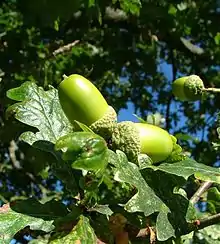landra
Galician

landras
Alternative forms
- alandua, alánduga, landre
Etymology
From Old Portuguese [Term?], from Latin glāndula (“little acorn; tonsil”), or from Vulgar Latin glandinem,[1] from Latin glāns (“acorn”), from Proto-Indo-European *gʷelh₂- (“acorn”). Doublet of glande or glándula. Compare also Spanish landre.
Pronunciation
- IPA(key): /ˈlandɾa̝/
Noun
landra f (plural landras)
- acorn
- Synonym: belota
- swollen lymph node
- 1409,José Luis Pensado Tomé (ed.), Tratado de Albeitaria. Santiago de Compostela: Centro Ramón Piñeiro, page 109:
- queimaras con fero feruente rredondo as llandooas que tem o Cauallo ontre o Collo et a cabeça so as qeixadas
- you'll burn with a round red hot iron the [swollen] nodes that the horse has in between the neck and the jaw
- queimaras con fero feruente rredondo as llandooas que tem o Cauallo ontre o Collo et a cabeça so as qeixadas
- 1409,José Luis Pensado Tomé (ed.), Tratado de Albeitaria. Santiago de Compostela: Centro Ramón Piñeiro, page 109:
Derived terms
- landeira
- Landoeira
References
- “landoa” in Xavier Varela Barreiro & Xavier Gómez Guinovart: Corpus Xelmírez - Corpus lingüístico da Galicia medieval. SLI / Grupo TALG / ILG, 2006-2016.
- “landra” in Dicionario de Dicionarios da lingua galega, SLI - ILGA 2006-2013.
- “landra” in Tesouro informatizado da lingua galega. Santiago: ILG.
- “landra” in Álvarez, Rosario (coord.): Tesouro do léxico patrimonial galego e portugués, Santiago de Compostela: Instituto da Lingua Galega.
- Coromines, Joan; Pascual, José A. (1991–1997). Diccionario crítico etimológico castellano e hispánico. Madrid: Gredos, s.v. landre.
This article is issued from Wiktionary. The text is licensed under Creative Commons - Attribution - Sharealike. Additional terms may apply for the media files.